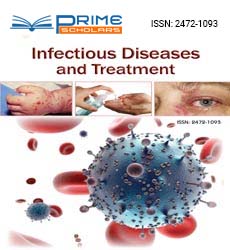Editorial - (2021) Volume 7, Issue 9
Replication of Dengue Virus Serotypes 1–4 by
siRNAs Bound to Non-Toxic Liposomes
Alexander Maxwell*
Department of Pathology, Federal University of Manchester, UK
*Correspondence:
Alexander Maxwell, Department of Pathology, Federal University of Manchester,
UK,
Email:
Received: 03-Nov-2021
Published:
24-Dec-2021
Dengue infection is caused by a ssRNA+ flavivirus that causes
dengue fever in humans. There is no specific treatment available
at this time. Silent RNAs (siRNAs) direct quality articulation and
have been successfully used to silence viral genomes; however,
they require controlled delivery. Liposomes with siRNA for quality
quieting show promising results. The goal was to design and test
DENV replication-blocking siRNAs bound to liposomes in vitro.
Using siDirect2.0 and Web-BLOCK-iTTM RNAiDesigner, siRNAs
were designed against DENV1-4 from preserved districts, and
the underlying in vitro assessment was aided by transfection into
HepG2 cells. Silent RNA was encapsulated in liposomes made of
D-Lin-MC3-DMA, DSPC, and Chol.
Plaque test and RT-qPCR were used to assess cytotoxicity,
hemolysis, favourable to fiery cytokine delivery, and antiviral
movement. A functioning centralization of siRNA was laid out at
40 nM. The siRNAs siRNA1, siRNA2, siRNA3.1, and siRNA4 were
encapsulated in liposomes, and their siRNA delivery via liposomes
resulted in a significant reduction in viral titers, no cytotoxicity
or hemolysis, and no induction of favourable to fiery cytokines.
Finally, liposomes containing DENV-specific siRNA were created,
and the virus was successfully protected in vitro.
Plaque test and RT-qPCR were used to assess cytotoxicity,
hemolysis, favourable to fiery cytokine delivery, and antiviral
movement. A functioning centralization of siRNA was laid out at
40 nM. The siRNAs siRNA1, siRNA2, siRNA3.1, and siRNA4 were
encapsulated in liposomes, and their siRNA delivery via liposomes
resulted in a significant reduction in viral titers, no cytotoxicity
or hemolysis, and no induction of favourable to fiery cytokines.
Finally, liposomes containing DENV-specific siRNA were created,
and the virus was successfully protected in vitro.
The etiological specialist responsible for dengue fever is known
as dengue infection. There is currently no antiviral specialist or
powerful immunisation available against the four serotypes,
and Sanofi Pasteur's main authorised antibody (Dengvaxia®) has low adequacy against serotypes 1 and 2 and can only be used to
vaccinate people who have previously been infected. Contrary to
popular belief, disease caused by dengue infection in vaccinated
people would elicit a genuine response. As a result, improving
antiviral systems is a critical choice for treating infection, reducing
viral burden, and reducing clinical sign entanglement..
DENV infection is one of the most well-known arboviruses that
affects people, posing a serious public health concern around the
world, particularly in tropical countries where natural conditions
favour the spread of Aedes aegypti and Aedes albopictus. Since
around 1995, it has been estimated that its appropriation is
comparable to jungle fever, with nearly 2.5 billion people living
in hazard zones.
Copyright: This is an open access article distributed under the terms of the Creative Commons Attribution License, which permits unrestricted use, distribution, and reproduction in any medium, provided the original work is properly cited.
